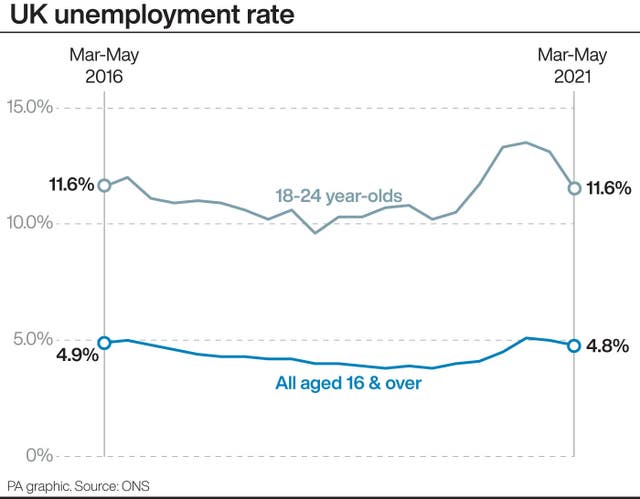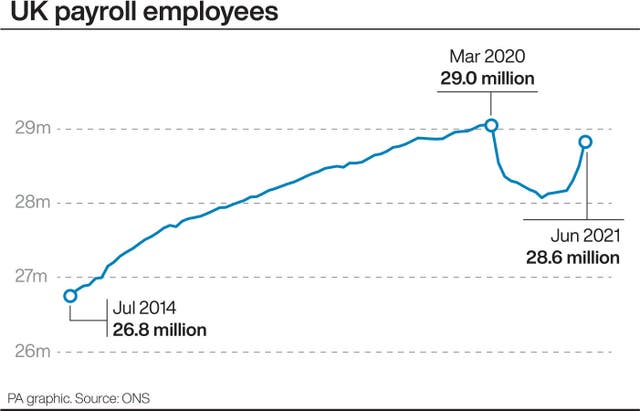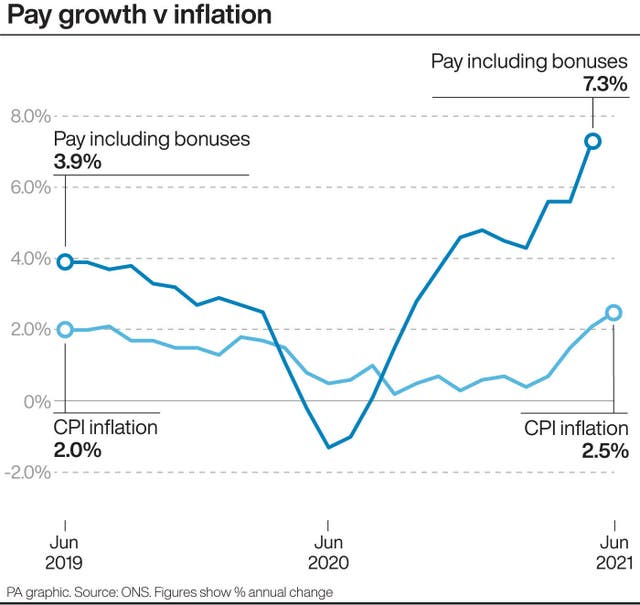UK jobs market recovery on a roll as vacancies surge and pay leaps higher
Official figures showed a record 356,000 increase in payrolled workers between May and June – the seventh monthly rise in a row.

The UK has seen the biggest leap in the number of workers on payrolls since the start of the pandemic as vacancies also soared thanks to the economic bounce back.
Official figures showed a record 356,000 increase in payrolled workers between May and June – the seventh monthly rise in a row – while firms hired at a blistering pace after indoor hospitality reopened and ahead of the final lifting of restrictions on July 19.
The Office for National Statistics (ONS) said the increase in payrolled workers was the biggest since the coronavirus crisis struck and since records began in 2014.
Pay was also shown to be booming and vacancies increased by 241,000 quarter-on-quarter to 862,000 between April and June.
This was 77,500 above the first three months of 2020, surpassing pre-pandemic levels for the first time, according to the ONS.
The jobless rate dropped again, to 4.8% between March and May, against 5% from December to February, but in line with a revised figure of 4.8% for the three months to April.
The ONS data showed that total unemployment fell 68,000 to 1.6 million between March and May, while employment rose 25,000 to 32.2 million.

The claimant count – another measure that includes people working with low incomes and hours, as well as people who are not working – fell by 114,800 month on month to 2.3 million in June.
Chancellor Rishi Sunak cheered a recovering economy and jobs market, saying: “We are bouncing back – the number of employees on payrolls is at its highest level since last April and the number of people on furlough halved in the three months to May.”
But the ONS said that, despite seven months of increases, the number of payrolled workers has fallen by 206,000 since the pandemic hit.
Experts are also forecasting unemployment to rise significantly once the furlough support scheme comes to an end in September, although this is set to be far less than initially feared.
The data showed some jobs cheer for hard-hit younger workers, with an increase of 101,000 payrolled employees aged under 25 last month.

This was driven by record hiring levels in the hospitality sector, with vacancies up 73,400 on the previous quarter, and soaring numbers of roles available in wholesale and retailing as these sectors have benefited from relaxing restrictions.
Darren Morgan, ONS director of economic statistics, said: “As the economy gradually reopened, the unemployment rate fell in March to May.
“This was especially marked for younger people, who had been hardest hit by earlier lockdowns.”
The data also showed total wage growth including bonuses soared to 7.3% in the three months to May, or 6.6% excluding bonuses, with further rises expected.

This puts the Government on track for a potential mammoth bill for its triple lock state pension pledge, which guarantees that annual pension payouts will rise in line with inflation, earnings or 2.5% – whichever is higher.
The ONS said this was being skewed due to a big fall a year earlier, while many jobs axed in the pandemic have been lower-paid roles.
It estimates underlying wage growth was between 3.9% and 5.1%, or 3.2% and 4.4% excluding bonuses.
Investec economist Sandra Horsfield said the figures show a “very strong acceleration in the pace of recovery in the labour market, which should underpin confidence and spending going forward, and seems to hint at a solid expansion in GDP in the second quarter”.





